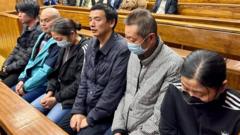Why Were Chinese Nationals Sentenced for Human Trafficking in South Africa?

Published: 2025-09-10 13:18:12 | Category: world
The recent sentencing of seven Chinese nationals to 20 years in prison for human trafficking and forced labour marks a significant moment in South Africa’s ongoing battle against this grave issue. The individuals were convicted for smuggling Malawians into South Africa and exploiting them in harsh working conditions.
Last updated: 20 October 2023 (BST)
Key Takeaways
- Seven Chinese nationals sentenced to 20 years for human trafficking in South Africa.
- Victims included 91 Malawians, many of whom were children, exploited in a factory.
- The case highlights South Africa's struggle with human trafficking as a source, transit, and destination country.
- The factory conditions were described as unsafe, with workers subjected to long hours and low pay.
- Authorities emphasise the need for collaboration to combat human trafficking more effectively.
Overview of the Case
In a landmark ruling, a South African court found seven Chinese nationals guilty of human trafficking and kidnapping. The defendants, identified as Kevin Tsao, Chen Hui, Qin Li, Jiaqing Zhou, Ma Biao, Dai Junying, and Zhang Zhilian, received sentences of 20 years each. This verdict comes after a lengthy six-year legal process following their arrest in 2019.
The 2019 Factory Raid
The arrests occurred during a police operation at a factory in Johannesburg, known as Beautiful City. Authorities acted on a tip-off from a worker who managed to escape the facility. Upon entering the factory, police discovered a shocking scene: 91 Malawian nationals, including 37 children, working under deplorable conditions.
Conditions Faced by the Victims
Reports revealed that workers faced extreme exploitation. They were compelled to work 11-hour shifts, seven days a week, without adequate safety measures or training. Additionally, their wages were significantly below South Africa's minimum wage of £1.22 ($1.64) per hour. Workers had their pay reduced for requesting time off, further entrenching their precarious situation.
Legal Implications and Charges
The defendants were charged with a total of 160 counts, including human trafficking, kidnapping, and various violations of labour laws. They were found guilty on 158 counts, which underscores the severity of their actions. This case not only highlights individual culpability but also reflects broader systemic issues within South Africa's labour market and immigration policies.
The Broader Context of Human Trafficking in South Africa
South Africa is identified as a significant hub for human trafficking, acting as a source, transit point, and destination for trafficked individuals. Factors contributing to this crisis include the country’s porous borders and socio-economic challenges, which make it vulnerable to exploitation.
The Role of Government Authorities
The South African prosecuting authority has expressed that this sentence may serve as a deterrent and strengthen the nation's efforts against human trafficking. Phindi Mjonondwane, a spokesperson for the authority, highlighted the need for increased collaboration among various government departments to effectively combat this issue.
What Happens Next?
While the sentencing of the seven individuals marks progress, it also raises questions about the ongoing trafficking issues in South Africa. Authorities must continue to develop comprehensive strategies to address the root causes of human trafficking and ensure that justice is served for all victims.
Community and Government Response
The Department of Labour, involved in the 2019 raid, welcomed the sentencing. They urged for an integrated approach to tackle human trafficking, suggesting that collaboration between government bodies is essential for eradicating such abuses. The complexity of the issue necessitates a multifaceted response that includes legal, social, and economic considerations.
Conclusion
The conviction of these seven individuals serves as a critical reminder of the ongoing fight against human trafficking in South Africa. It is essential for the government, NGOs, and communities to work together to protect vulnerable populations from exploitation. As this case demonstrates, significant efforts must be made to combat these crimes and provide support for victims.
How can we ensure that such exploitation does not happen again in the future? The fight against human trafficking requires vigilance and action from all sectors of society. #HumanTrafficking #SouthAfrica #JusticeForVictims
FAQs
What is human trafficking?
Human trafficking involves the illegal trade of people for exploitation purposes, including forced labour, sexual exploitation, and slavery-like practices.
What were the conditions in the factory?
The factory conditions were dire, with workers forced to work excessively long hours without proper safety measures or adequate compensation, often in unsafe environments.
How does South Africa combat human trafficking?
South Africa employs various strategies, including law enforcement operations, public awareness campaigns, and collaboration between government departments to combat human trafficking.
What are the legal repercussions for human trafficking in South Africa?
Individuals convicted of human trafficking in South Africa can face severe penalties, including lengthy prison sentences, as evidenced by the recent sentencing of the seven Chinese nationals.
What support is available for trafficking victims?
Victims of human trafficking can access various support services, including legal assistance, counselling, and rehabilitation programmes provided by government and non-governmental organisations.



